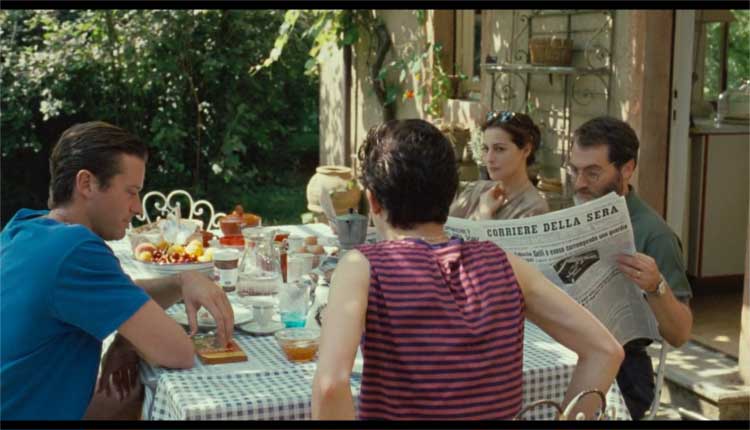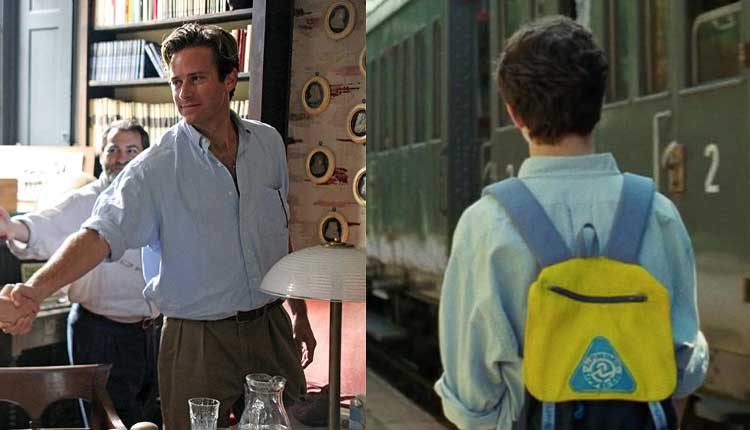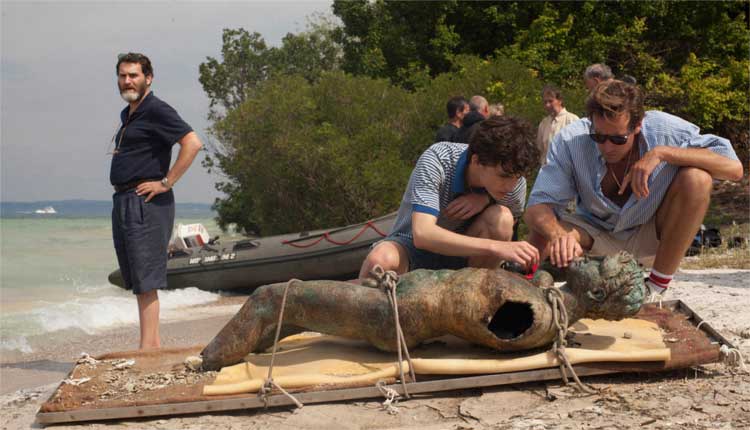Ten Things in Call Me by Your Name You May Have Missed
Following news that a sequel has been confirmed, Cal McGhee highlights ten things in Call Me by Your Name you may have missed upon first watch
As much as we may have rooted for Call Me by Your Name to bag more awards at the Oscars, it is undeniable that the film has left a lasting mark on many of the souls who went to see it, including myself.
Whether it be for deeply personal reasons or simply a taste acquired after years of LGBT entries that fail to really capture love, both lost and found, Luca Guadagnino’s languid and sensual romance brought to the fore topics most of us can identify with; summer romances, obsessive love, lust, the sweet pain of something beautifully temporary, and ultimately, that first one true love that will likely dominate your thoughts no matter how much you move on and grow from it. It proved you do not have to be part of the LGBT community to be truly immersed in an LGBT story.
Call Me by Your Name possesses a rewatchability that few modern movies can replicate. It is near-impossible to just see once. Upon each viewing, you will spot new references, correlations and minute details that build on Guadagnino’s subtle qualities as a director. A rewatch highlights how much words really can be ‘futile devices’ in comparison to the character’s actions.
Here are ten things in Call Me by Your Name you may have missed.
Elio’s mother knew the whole time
Before things start to heat up between Elio and Oliver, Elio’s mother Annella sees through her son’s initial disdain for their latest live-in grad student and simply asks if he likes him. Being the magnetic and congenial ‘movie star’ he is, Oliver has quickly won the hearts of all who inhabit their quaint Italian village. Elio admits he does but points out that everyone else does too. She responds: “You like him, Oliver? I think he likes you too. More than you do.”
There are subtle references to her all-seeing eye throughout their blossoming relationship, most apparent at the breakfast scene the morning after their first tryst, in which Elio sits down awkwardly into his chair. Her smug glances across the table suggest she is fully aware of why he is walking so strangely.

There’s an Armie on the dancefloor
Chances are, even if you haven’t seen the movie, you have seen GIFs of Armie Hammer dancing with wild abandon on your twitter timeline. This scene is arguably the moment Elio realizes just how deep his feelings are becoming for Oliver, and what better song to fit the moment than Psychedelic Furs’ Love My Way? If you listen closely to the opening lyrics, you will hear ‘There’s an army on the dance floor’. There certainly was an army on the dance floor … Armie Hammer.
The shirt
Billowy – the word given by Elio to describe Oliver’s signature blue shirt on their first encounter – symbolizes Elio’s desire to remember the time he spent with Oliver and to give it continued meaning in his life after Oliver leaves. In advance of Oliver leaving, Elio requests to keep the shirt for himself as a reminder of what he once had. When they depart near the end of the film, Elio can be seen wearing the exact shirt. Oliver gave it to him after all.

Elio and cinematic anthropomorphism
The eroticism derived from ancient nude sculptures has a lasting presence in the first act. Oliver’s purpose in Italy is to study these subjects and develop his academic paperwork with Elio’s father, but notice the way he admires the washed-up figure on the beach mirrors his later fascination with Elio’s similar chiseled and statuesque beauty. His reverence and gestures are one in the same, setting up a comparison to both characters as works of art.
Elio is pictured in several poses mirroring that of the washed-up statue, and it is undeniable that Timothée Chalamet himself bears an uncanny resemblance to figures frequently sculpted in ancient Greece, from the tight curls of his hair to his striking jawline and bone structure. Conversely, Hammer embodies the awe-inspiring power of such statues, frequently filmed from below to enhance his already imposing 6ft 5 frame.

The significance of ancient Greece
The frequent references to ancient Greece tie-in to the subject matter of Call Me by Your Name seamlessly when you look back at the history of how sexually liberated the Greeks were. Historical evidence suggests the Greeks were one of the earliest civilizations to embrace fluid sexuality, particularly in warfare. Commonly, warriors would be encouraged to fight as fiercely as possible to impress their male lovers on the battalion and were considered the most ferocious in the battlefield.
But a direct correlation from ancient Greek practices resonates with the age-gap issue in the storyline. Pederasty was a common tradition wherein an older man, typically in his mid to late 20s, mentored a younger male, usually a teenager, and they would be lovers until the older male married and the younger male entered his passage into manhood. The intellectual undercurrent of Elio and Oliver’s relationship, in relation to music and Greek philosophy, echoes the practice of pederasty in several ways. They are both the right age, learn from each other, and ultimately are driven apart by Oliver’s impending marriage and Elio’s need to ‘grow up’, as the midnight letter stated.
Not to mention, Elio’s unusual name is derived from the word Helios: the Greek word for ‘sun’ and the name of an ancient deity whose surviving busts, once again, resemble Chalamet in appearance.
The peach scene
Of course, the peach scene has quickly made its way to public attention and has caused a bit of a spike in sales for the ripe fruit. However, the scene has not been cheapened enough to be the American Pie of the 2010s just yet, and the story behind why a peach was chosen for the scene ensures Chalamet will not become this generation’s Jason Biggs.
In Chinese mythology, peaches are a symbol of longevity and immortality, frequently featured in Chinese art and fables. One such fable tells of an emperor who fell in love with a male courtesan and kept their love affair a secret from his kingdom. One day, the courtesan picked a particularly sweet peach and, after one bite, gave the rest to the emperor. The emperor was so enamored by the gesture that he publicly declared his love for him. Ever since, the love between two men has been referred to as ‘the sharing of the peach’ in ancient Chinese culture among others.
Once Elio is…ahem…’done’ with the peach, Oliver is about to eat it but is stopped, suggesting their love will never be common knowledge among their families. This differs from the book, however, and comes not long after a passage that relates the peach to ancestry and intertwines Oliver and Elio with their Semitic backgrounds, which brings me to my next point.
The star of David
The author of Call Me by Your Name, André Aciman, stated the characters’ shared Judaism was an analogy for their shared ambiguous sexuality. It connected them. There is a deeper emphasis on this in the book, however. The star of David necklace that Oliver wears under his shirt sparks a comparison to ‘hidden identities’, drawing the themes of Judaism and homosexuality closer together. Elio discarded his own necklace before meeting Oliver but begins to wear it again to showcase his newfound pride in who he is.
There is a debate on whether Oliver actually gives Elio his own star of David at the juncture of the film. At the train station, Elio is seen wearing two golden necklaces – one is clearly a star of David, while the other is not in focus and concealed by clothing. Oliver is shown without his necklace, which suggests he may have given it to Elio as a second parting gift at the train station.
Silence and the word ‘later’
One of my favourite moments in Call Me by Your Name was Elio’s lazy summer afternoon with Marzia as they listen to Words by F.R. David. ‘Words don’t come easy to me’. As David repeats the chorus, it got me thinking about the use of imagery and body language rather than dialogue to fill in the blanks of what mostly goes unspoken between Elio and Oliver.
In an interview with Vanity Fair, Aciman stated he ‘couldn’t write silence’. He said: ‘what I do is chisel a statue down to its finest, most elusive details. What a film director does is make the statue move.’ More statue analogies from Aciman himself, whose novel is verbose and has a breath of poetry that is, as he admits, difficult to capture on film. Guadagnino’s film adaptation translates the many silent exchanges and suggestive glances between the two central characters in ways that only a facial expression or a pregnant pause can. After all, although it is overwhelmingly evident that our central figures are deeply in love, the words ‘I love you’ are never shared in the film or even the book.
The most potent examples of this come towards the end, beginning with the cinematography of their trip to the waterfall. Oliver traipses behind and pauses for a moment to soak up the view, and his last few days in Italy. Elio continues at a faster pace, leaving Oliver behind. Not only does this suggest Elio is ahead of Oliver in terms of youth and veracity, particularly as Oliver is seen breathless and struggling with the steepness of the hill, but also points out that Oliver is fully aware his time with Elio is limited. He has responsibilities that Elio does not yet understand, a life away from Italy, and pressures from adulthood that force him to grasp the moment, whereas Elio carries on, blissfully unaware.
Driving further on the difference in maturity of the two protagonists is Oliver’s restless last night in Rome. Elio sleeps peacefully, content and living fully in the present like a youth would, ignorant of what tomorrow will bring. From the start, Oliver has not had this outlook and, once again, silence and haunting facial expressions are all Guadagnino needs to convey his inner turmoil.
Alas, I come to the train station scene once again. Their final encounter is one that takes the already broken shards of your heart and stomps on them repeatedly. As they face their final goodbye, we, as viewers, long to hear Oliver’s signature ‘later’ as he embraces Elio in a lengthy and emotionally crippling hug, but he does not. He knew there would not be a ‘later’, and he didn’t want to leave on an empty promise.
Last but not least, Guadagnino employs the tactical silence of our characters in its climax with a wordless, poignant, three-minute shot of Chalamet in front of the fireplace as a mixture of emotions parade across his face. It echoes a saying that is heard throughout both the book and its adaptation; ‘is it better to speak or to die?’ Evidently, both characters chose the latter. Gut-wrenching stuff.
The author makes a cameo
Aciman makes an appearance as half of the Sonny and Cher couple who come to visit Elio’s parents. The couple were originally intended to be nicknamed Laurel and Hardy, but a creative decision was made to change this to Sonny and Cher for fear younger audiences would not know who Laurel and Hardy were.
Many viewers wonder if Elio’s dislike of the couple is an act to detract suspicion from his own sexuality, or if their presence was a reminder of how unlikely his ideal future with Oliver could really be. His father reprimands him for his derogatory remarks, giving a glimpse of the liberal views he holds later on in the most touching father-son talk ever captured on film.
Visions of Gideon
Any fans of Sufjan Stevens out there will see a clear pattern of religious imagery in his music, and Visions of Gideon did not escape this strategy.
Gideon was a prophet who administered an army of 300 men to defeat a much larger opposition. Their victory was ensured by a series of signs delivered to him by Yahweh so that the people of Israel may be freed. The ambush was a success and Gideon was worshipped by Israel before his death. Gideon was a young, Jewish male who had a deep devotion to God, but he stopped receiving visions once this battle was won.
Sufan’s song brings the story of Gideon to life by making a parallel between Elio and Gideon, both young, Jewish males deeply devoted to a heavenly being who eventually abandons them. Oliver is seen as ‘God’ in this parallel and even refers to his favourite spot by the pool as ‘heaven’ several times throughout the film.
The song also refers to something beautifully bittersweet but temporary, such as Gideon’s victory, and the inability to relive a moment. The lyric ‘is it a video?’ emphasises this detachment. Elio can relish the memory, but never truly experience it again.
So, Call Me by Your Name really has a lot going for it when you take a closer look. The depth and wealth of influences it draws from, not only from the adapted source material, but from the other parts of the film itself as well, combine to create something that has a long and lasting effect on people, something that can be studied and analyzed repeatedly.
With a sequel confirmed by Guadagnino himself, and with Hammer and Chalamet reprising their roles, it is impossible not to wonder where this story will take us next. The closing chapter of the book gives us some foresight that was not featured in the film, but it is possible Guadagnino may abandon that chapter altogether in favour of his own idea of where Oliver and Elio are in their lives five years on from their sunwashed, Italian adventure. I’ll certainly have my front-row ticket.

